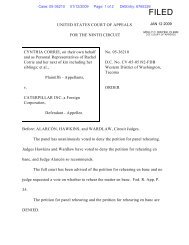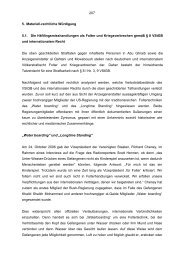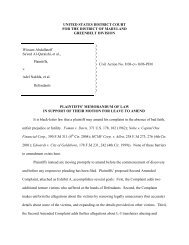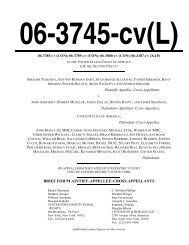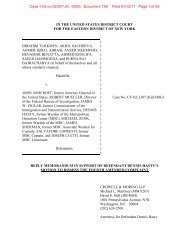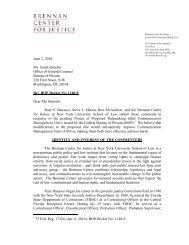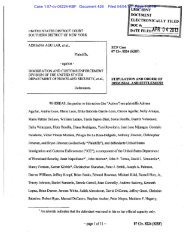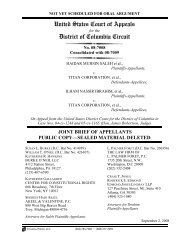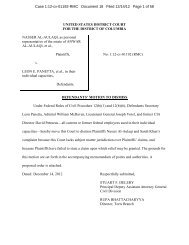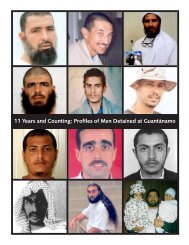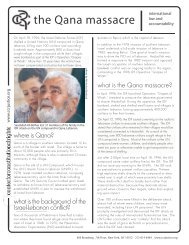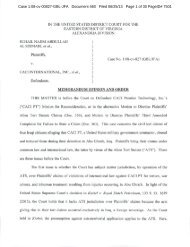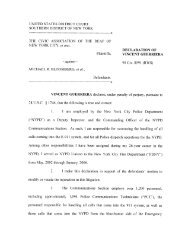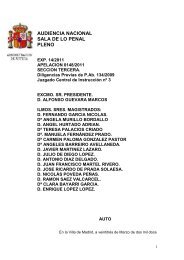CCR Annual Report 2005 - Center for Constitutional Rights
CCR Annual Report 2005 - Center for Constitutional Rights
CCR Annual Report 2005 - Center for Constitutional Rights
You also want an ePaper? Increase the reach of your titles
YUMPU automatically turns print PDFs into web optimized ePapers that Google loves.
ABUSE:GUANTÁNAMO<br />
8<br />
<strong>CCR</strong> v Unlawful Detention<br />
The Supreme Court’s June 2004 decision in the Guantánamo case of Rasul v. Bush was a<br />
powerful vindication of <strong>CCR</strong>’s ef<strong>for</strong>ts to uphold the U.S. Constitution and preserve the<br />
rule of law even as the United States prosecutes its worldwide “war on terror.” In defiance<br />
of the ruling by our nation’s highest court, the Bush Administration continues to<br />
argue not only that no court may review its conduct at Guantánamo but also that human<br />
rights standards enshrined in the Geneva Conventions and other international treaties<br />
do not apply.<br />
<strong>CCR</strong> created the Guantánamo Global Justice Initiative to challenge our government’s<br />
practices of unlawful detention, torture, and abuse. Through litigation, grassroots organizing,<br />
and other strategic advocacy, the Initiative addresses the humanitarian, legal, and<br />
legislative issues involved in every stage of detention: from a detainee’s initial seizure, to<br />
his transfer, to interrogation and treatment, to trial by special military tribunal, and to<br />
sentencing and punishment or eventual release.<br />
<strong>CCR</strong> has led a massive ef<strong>for</strong>t to recruit, train, and provide ongoing litigation support to a<br />
national <strong>for</strong>ce of more than 450 pro bono attorneys representing the Guantánamo<br />
detainees. In addition to guiding volunteer attorneys through the basics of habeas<br />
corpus litigation and international human rights law, <strong>CCR</strong> coordinates strategic<br />
responses to new legal challenges as they arise. In a parallel ef<strong>for</strong>t to ensure legal representation<br />
<strong>for</strong> each detainee, <strong>CCR</strong> filed Doe v. Bush on behalf of hundreds of unnamed<br />
prisoners whose identities the government refuses to disclose.<br />
In March, <strong>CCR</strong> successfully mobilized its network of cooperating attorneys to block the<br />
government’s plans to render up to half of the population at Guantánamo to prisons in<br />
Saudi Arabia, Afghanistan, and Yemen, and obtained orders preventing the transfer of<br />
detainees into the custody of other countries without judicial oversight.<br />
The Administration’s defiance of the Rasul ruling means that the struggle in the federal<br />
courts to define the detainees’ rights will likely culminate in arguments be<strong>for</strong>e the<br />
Supreme Court <strong>for</strong> the second time in two years. <strong>CCR</strong> will continue to seek justice <strong>for</strong><br />
every person detained at Guantánamo Bay and to work to establish a body of fundamental<br />
rights that will apply to all prisoners in U.S. custody anywhere in the world.



